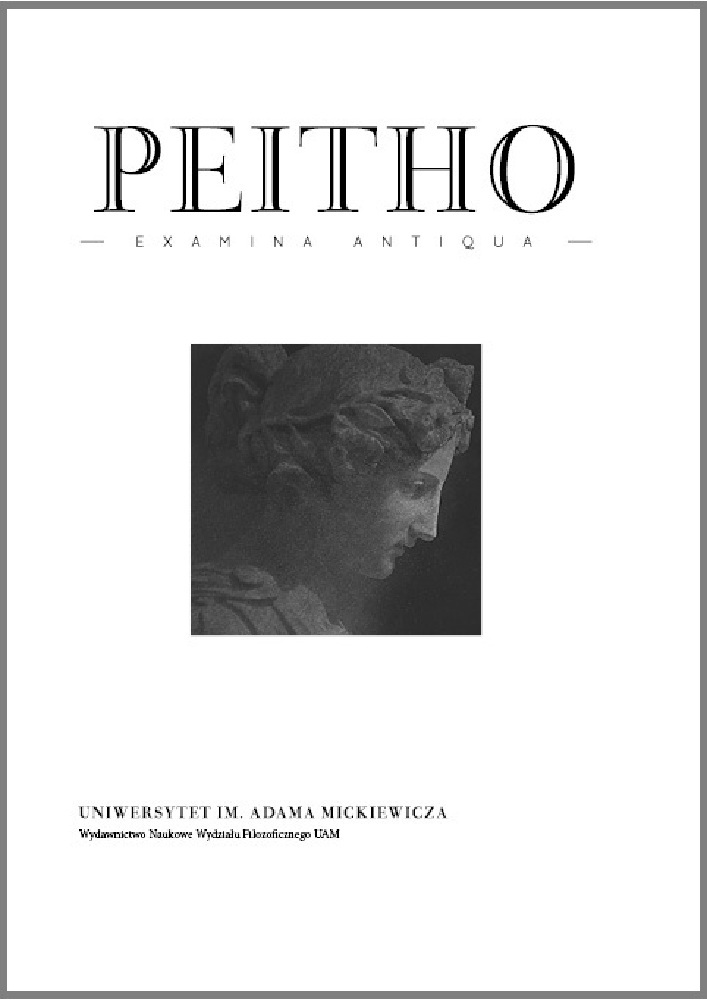Abstract
The present paper makes the following points. (1) The summary given in Sextus Emp. Math. VII is of much greater value than usually acknowledged, since it preserves several key elements of Gorgias’ communicational strategy. (2) A sketchy trilemma is available in the opening sentence of Philolaos (DK 44B2) as well as in a passage of Plato’s Parmenides. This is evidence in favor of the hypothesis that the very first known trilemma was devised by Gorgias and not by Sextus himself or Aenesidemus. (3) Not unlike Zeno, Gorgias enjoyed to be neither serious nor joking, but remained somewhat halfway. This point is seldom acknowledged, though it is crucial in order to understand that he pretends to claim (e.g. that p), but his claims do not amount to any points of doctrine. (4) That he remains halfway should not prevent us from appreciating some of his ideas, but, at the same time, we should not expect full intellectual adhesion to what he tells us. Besides, something similar occurs in most of Plato’s dialogues. (5). Gorgias owes a lot to Melissus.
References
Bremer, D., 2013, «Von der frühen Philosophen zu den Sophistik», in: H. Flashar, D. Bremer, H. Rechenauer (hrsg.), Die Philosophie der Antike, Bd. I: Frühgriechische Philosophie, Basel, pp. 949–970.
Casertano, G., et al., 2015, ELEATICA 2012. Da Parmenide di Elea al Parmenide di Platone, Sankt Augustin.
Diels, H., Kranz, W., 19526, Die Fragmente der Vorsokratiker, Bd. 1–3, Berlin.
Giombini, S., 2012, Gorgia epidittico, Passignano s.T.
Guthrie, W. K. C., 1969, A History of Greek Philosophy, vol. III: The Fifth-Century Enlightenment, Cambridge.
Ioli, R., 2007, «Il silenzio di Platone e Aristotele sul Περὶ τοῦ μὴ ὄντος di Gorgia», Dianoia 12, pp. 7–42.
Ioli, R., 2009, «Gorgia scettico? Una riflessione sulla presenza del sofista nelle opere di Sesto Empirico», Rheinisches Museum für Philologie 152, pp. 331–357.
Ioli, R., 2013, Gorgia. Testimonianze e frammenti, Roma.
Kerferd, G. B., 1981, The Sophistic Movement, Cambridge.
Kerferd, G. B., Flashar, H., 1998, «Die Sophistik», in: H. Flashar (hrsg.), Die Philosophie der Antike, Bd. 2.1: Sophistik. Sokrates. Sokratik. Mathematik. Medizin, Basel, pp. 1–137.
Laks, A., Most, G. (ed.), Early Greek Philosophy, 9 vols, Cambridge 2016 (Les débuts de la Philosophie, des premiers penseurs grecs à Socrate, Paris 2016).
Mazzara, G., 1982, Gorgia ontologo e metafisico, Palermo.
Mazzara, G., 1999, Gorgia. La retorica del verosimile, Sankt Augustin.
Newiger, H.-J., 1973, Untersuchungen zu Gorgias’ Schrift Über das Nichtseiende, Berlin.
Newiger, H.-J., 1979, «Gorgias von Leontinoi und die Philosophen vor Sokrates», Würzburger Jahrbücher für die Altertumswissenschaft 5, pp. 47–60.
Rossetti, L., 1985, «Lo scambio secundum quid/simpliciter nel Περὶ τοῦ μὴ ὄντος», Siculorum Gymnasium 38, pp. 107–117.
Rossetti, L., 2010, «Zenone di Elea, maestro in comunicazione», in: F. Cortés Gabaudan, J.V. Méndez Dosuna (eds.), Dic mihi, musa, virum. Homenaje al Profesor Antonio López Eire, Salamanca, pp. 595-602.
Rossetti, L., 2011, «Un filosofo senza filosofia», in: J. Barnes et al., ELEATICA 2008. Zenone l’infinito, Sankt Augustin, pp. 171–183.
Rossetti, L., 2013, «Plato’s and Aristotle’s ‘Bad’ Summaries of the Republic», in: N. Notomi, L. Brisson (eds.), Dialogues on Plato’s Politeia (Republic), Sankt Augustin, pp. 355-360.
Rossetti, L., 2015, La filosofia non nasce con Talete, e nemmeno con Socrate, Bologna.
Rossetti, L., 2017a, Un altro Parmenide, vol. I-II, Bologna.
Rossetti, L., 2017b, «La empresa de Zenón, monumento a la creatividad», Hypnos 39.
Wesoły, M., 1983–1984, «L’argomento proprio di Gorgia», Annali dell’istituto Italiano per gli Studi Filosofici 8, pp. 15–45.
Wesoły, M., 1985, «Le tecniche argomentative di Gorgia intorno alla tesi che nulla esiste», Siculorum Gymnasium 38, pp. 311–341.
Wesoły, M., 2013, «La “dimostrazione propria” di Gorgia», PEITHO. Examina antiqua 4, pp. 159–176.
License
Peitho provides immediate open access to its content on the principle that making research freely available to the public supports a greater global exchange of knowledge.
